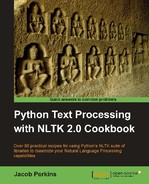A common occurrence with text processing is finding text that has a non-standard character encoding. Ideally, all text would be ASCII or UTF-8, but that's just not the reality. In cases when you have non-ASCII or non-UTF-8 text and you don't know what the character encoding is, you'll need to detect it and convert the text to a standard encoding before further processing it.
You'll need to install the chardet module, using sudo pip install chardet or sudo easy_install chardet. You can learn more about chardet at http://chardet.feedparser.org/.
Encoding detection and conversion functions are provided in encoding.py. These are simple wrapper functions around the chardet module. To detect the encoding of a string, call encoding.detect(). You'll get back a dict containing two attributes: confidence and encoding. confidence is a probability of how confident chardet is that the value for encoding is correct.
# -*- coding: utf-8 -*-
import chardet
def detect(s):
try:
return chardet.detect(s)
except UnicodeDecodeError:
return chardet.detect(s.encode('utf-8'))
def convert(s):
encoding = detect(s)['encoding']
if encoding == 'utf-8':
return unicode(s)
else:
return unicode(s, encoding)Here's some example code using detect() to determine character encoding:
>>> import encoding
>>> encoding.detect('ascii')
{'confidence': 1.0, 'encoding': 'ascii'}
>>> encoding.detect(u'abcdé')
{'confidence': 0.75249999999999995, 'encoding': 'utf-8'}
>>> encoding.detect('222222223225')
{'confidence': 0.5, 'encoding': 'windows-1252'}To convert a string to a standard unicode encoding, call encoding.convert(). This will decode the string from its original encoding, then re-encode it as UTF-8.
>>> encoding.convert('ascii')
u'ascii'
>>> encoding.convert(u'abcdé')
u'abcd\xc3\xa9'
>>> encoding.convert('222222223225')
u'u2019u2019u201cu2022'The detect() function is a wrapper around
chardet.detect() which can handle UnicodeDecodeError exceptions. In these cases, the string is encoded in UTF-8 before trying to detect the encoding.
The convert() function first calls detect() to get the encoding, then returns a unicode string with the encoding as the second argument. By passing the encoding into unicode(), the string is decoded from the original encoding, allowing it to be re-encoded into a standard encoding.
The comment at the top of the module, # -*- coding: utf-8 -*-, is a hint to the Python interpreter, telling it which encoding to use for the strings in the code. This is helpful for when you have non-ASCII strings in your source code, and is documented in detail at http://www.python.org/dev/peps/pep-0263/.
If you want pure ASCII text, with non-ASCII characters converted to ASCII equivalents, or dropped if there is no equivalent character, then you can use the
unicodedata.normalize() function.
>>> import unicodedata
>>> unicodedata.normalize('NFKD', u'abcdxe9').encode('ascii', 'ignore')
'abcde'Specifying 'NFKD' as the first argument ensures the non-ASCII characters are replaced with their equivalent ASCII versions, and the final call to encode() with 'ignore' as the second argument will remove any extraneous unicode characters.
